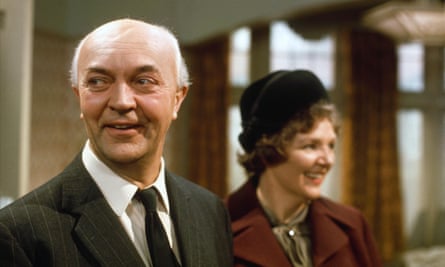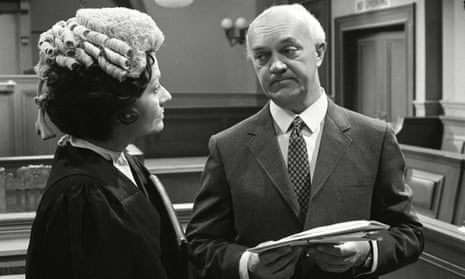The brilliant character actor George A Cooper, who has died aged 93, is particularly remembered for portrayals of the dodgy businessman Willy Piggott in Coronation Street between 1964 and 1971; Billy Liar’s dad in the television sitcom of Keith Waterhouse and Willis Hall’s novel and play in 1973; and the grumpy caretaker, Mr Griffiths, in Grange Hill between 1985 and 1991.
Balding, saturnine, slightly threatening, with piercing dark eyes and a robust sandpaper vocal delivery, Cooper was a striking presence in all three roles – and as countless other authoritarian and shadowy figures on just about every major television series over 40 years, from Dixon of Dock Green and The Avengers through Taggart, Casualty and Heartbeat.
But an appearance on Steptoe and Son in 1962 renewed his crucial, career-defining association with Harry H Corbett for several years as a pair of stalwarts in Joan Littlewood’s Theatre Workshop company in Manchester and London after the second world war.
Cooper worked with Littlewood from 1950 to 1955, and when both he and Corbett left, for different reasons, Littlewood was devastated and declared in her autobiography that this double defection marked the real end of her Theatre Workshop adventure; she had not even embarked on the string of productions – A Taste of Honey, The Hostage, O What a Lovely War! – that made her, and the Workshop, based in Stratford East after 1953, world famous. After the early years of struggle, she called these hit shows “work on scripts”.
Born in Leeds, George was the son of Alphonsus William Cooper, a railway guard, and his wife, Eleanor (nee Dobson). He developed a taste for the theatre as a schoolboy in Headingley. After training as an engineer and an architect, he “got serious” about acting while doing his national service with the Royal Artillery in India, where the officer who ran the theatre company was Joseph O’Conor, later a well-known actor himself.
Demobbed in 1946, Cooper joined an amateur theatre company and found his way to Theatre Workshop via an audition that extended over a three-week assessment period. What swung it, Cooper said, was his DIY practicality and ability to fix things; and he was happier doing that in a theatre than working, as he had done for three years, in the world of reinforced concrete.
The early Theatre Workshop days were spent on tour and in schools performances, occupying a Glasgow “posh squat” lent to them by a property tycoon known as the mad millionaire of Maryhill, and then, when a Glasgow-based theatre did not materialise, doing up the Theatre Royal in Stratford East while living (illegally) in the dressing rooms and cooking on gas rings; Cooper’s speciality was an apple omelette.
For Littlewood, Cooper and Corbett were her chief sparring partners, as Richard Harris and James Booth would be several years later. Cooper, she said, was agile as a monkey, light on his feet, while Corbett was a master of swordplay, wrestling, all forms of fighting. The hand-to-mouth existence of touring and rapid turnover of productions, with all members of the company functioning in all practical and domestic directions, created a tightly knit sense of urgency and dependency that defined the operation. But it led to tensions, too.

Before these surfaced, Corbett was Aguecheek, and Cooper Malvolio, in the Twelfth Night that opened the run-down, rough-house Theatre Royal in 1953 (Cooper had pennies thrown at him, with cries of “big head” on account of his tall Elizabethan hat), and they followed in the same year in Ben Jonson’s The Alchemist, Corbett as Face, Cooper as Sir Epicure Mammon (he was nearly scythed in half when the iron safety curtain suddenly crashed downwards on his entrance one night in a sedan chair).
Both actors had to activate the initial of their respective middle names because of Harry Corbett, the Sooty puppeteer, already established, and another George Cooper on Equity’s books. Thus newly monikered, the pair, who also featured in productions in this period of Molière’s Le Malade Imaginaire, Shaw’s Arms and the Man, Jean Giraudoux’s Amphitryon 38 and Shakespeare’s Richard II (Corbett as the king, Cooper as Bolingbroke), led the company in triumph, with Avis Bunnage, Corbett’s girlfriend at the time, to an international festival in Paris in 1955. The plays were the anonymously written Elizabethan murder thriller Arden of Faversham and Ben Jonson’s Volpone. Of Cooper’s performance in the latter, a Parisian critic opined that nothing since Orson Welles had rivalled it.
On their return, Corbett sought the brighter lights of the West End while Cooper, who in 1955 had married Shirley Jones, a wardrobe assistant with Theatre Workshop, was keen to work more in television. Shirley did not like him being out every night on the stage; he rarely trod the boards thereafter.
The leftwing producer Oscar Lewenstein, however, a friend of Littlewood’s, persuaded him to play Tiger Brown in The Threepenny Opera by Brecht and Weill at the Royal Court in 1956 (the show, which ran for six months, moving on to the Aldwych and the Comedy, ushered in the new dawn of the English Stage Company and Look Back in Anger) and then a leading role – as Albert Finney’s dad – in the 1960 West End premiere of Billy Liar at the Cambridge theatre, directed by Lindsay Anderson.
His third show for Lewenstein was Murray Schisgal’s Luv (Arts theatre, 1963), in which three middle-aged New Yorkers – the others were played by Fenella Fielding and the comedian Dick Emery – competed over who had endured the toughest childhood.
And for what was, in effect, his farewell to the stage in 1964, Littlewood cast him as Falstaff in her amalgamation of the Henry IV plays at the Edinburgh Festival; the critics were not enthusiastic, but Littlewood’s assistant, the writer Peter Rankin, said that Cooper’s exit to the wars, along the vast catwalk designed by John Bury in the Assembly Hall, waved off by a tearful Bunnage as Mistress Quickly, was “heartbreaking”.
He did accept the role of Friar Tuck in Lionel Bart’s ill-fated Robin Hood musical Twang!! (1965) but left the show after a catastrophic preview in Manchester and before the equally disastrous West End opening at the Shaftesbury (it ran for 43 performances), the direction having passed, to no avail, and still more chaos, from Littlewood to Burt Shevelove.
As his television work gathered head, Cooper appeared on either side of the law in two movies, Basil Dearden’s Violent Playground (1958) starring Stanley Baker, and a Charlie Drake crime caper, The Cracksman (1963). Also in 1963, he popped up in Tony Richardson’s exuberant Tom Jones, jumping into Joyce Redman’s (as Mrs Waters) warm bed just after Albert Finney’s Tom made his escape.
On television, outside the well-known series, he was in David Mercer’s In Two Minds (1967), a groundbreaking film by Ken Loach shot entirely on location and starring Anna Cropper as the patient subjected to ECT treatment for schizophrenia; and in Doug Livingstone’s I Can’t See My Little Willie (1970), alongside Nigel Stock and Avril Elgar, a bleakly comic family get-together directed by Alan Clarke.
George and Shirley eventually settled in Surrey, near Guildford, before moving to a fine old farm house in Petersfield, Hampshire. Shirley died in 2000. George, who loved gardening and, as one relative put it, “messing about with bits of wood”, is survived by their son, Adam.

Comments (…)
Sign in or create your Guardian account to join the discussion